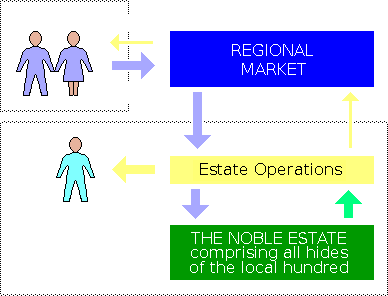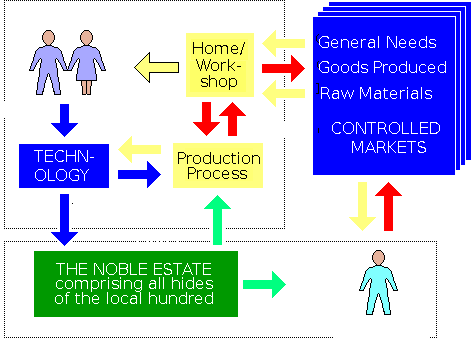
Ch09: Footnotes
The Event Horizon
The Dispossessed
Idyllic State
Purpose of Law
The Middleman
Noble Capitalist
The Noble Estate
Legal Theft
Advances in methods & technology reduce the labour required to work an estate. So former bound labourers are cast out into a regional labour pool without land or means. Some survive by becoming trading artisans serving the local market within the community of their former Hundred.
Within the noble Estates, ideas continue to develop. New methods of organising labour result in less labour being required. Since labourers are maintained at subsistence level, this means that less resources are needed to support the workforce required to achieve a given level of production.
Formal methods of organising armies are also developed. These turn a given number of soldiers into a more effective fighting force. In addition, advances in planning, administration and logistics enable armies to operate for longer periods much further from base.
These advances enable ambitious noblemen to prey on and subdue all their neighbours within their larger natural Region. This induces Estates to form alliances for mutual defence against such predators. When these alliances expand they eventually crystallise into a single Regional State.
The separate armies of the Estates are then finally unified into a single State defence force under the control of a dominant nobleman or king.
New methods and technologies demand an ever-increasing variety of specialist skills. These are not available within the labour force of any single Estate. However, though on a particular Estate all of these skills may be needed some of the time, they are not needed all of the time.
The nation-State provides a peaceful umbrella under which Estates can trade without hindrance on a Regional scale. An Estate with a specialist it does not currently need can therefore rent him out to an Estate which does.
Further advances in methods and technology demand even greater flexibility in the way specialist labour is used. This is achieved by freeing specialist workers from bondage to a specific Estate into a common labour pool.
Estates are thus able to hire specialist labour at will from a free market. They no longer have to provide the labourer with a home. They have no obligation toward him other than to pay his subsistence for the duration of his hire. What happens to him or his family once his hire is finished is his problem. He must find employment with another Estate or starve. He must search the length and breadth of the land, always on the move.
In the agrarian economies of the Estates, the demand for non-specialist labour is mostly seasonal. It is unnecessary to have a full work force on site all the time. Therefore, like the specialists, the unskilled are also cut adrift from the Estates to become part of a common Regional labour pool from which they can be hired and fired at the whim of the nobility. Thus the former wanderer has settled. He is now master of his Estate. On the other hand, the former settler is now forced by his new economic circumstances to become a nomad. The order has become reversed.

The former settlers have regained the freedom they lost when their Hundred was first oppressed, and then possessed, by the wanderers. They are no longer the nobleman's bond slaves. They are free to come and go where they wish. But unlike their ancient ancestors they have no land. They have become dispossessed.
They may not pick the fruit off the trees. It belongs to a nobleman. Nor may they cut wood for fuel. It is the nobleman's forest. They cannot build homes or plant crops. It is the nobleman's ground. They may not camp except by the nobleman's leave, and they must move on when he tells them.
The Law of the nobleman has cut them off from the very environment which sustains them. Thus any action they take, without his permission, to promote their survival is illegal. If the nobleman has no use for them they must seek employment with another far away. Else they die.
Though they no longer have the right to use the land in which they live, the former settlers are still part of the same anthropological community in which everybody knows everybody else. It embodies an established network of emotional bonds pulling them all together. Bonds which are strengthened by their adversity. And they are still settlers by nature: not nomads. They are emotionally bonded to the land on which they were born — individually to their hides and collectively to their Hundred.
So when forced to find work beyond their natural community it is the individual who ventures forth: not the entire family. The family — most of all its children — need a stable community environment. The inevitable by-product of a Regional labour pool is thus the absent father — an unnatural and detrimental state for a human family.
The noblemen have thus cast off responsibility for keeping their former bonded labourers and cast them out into a barren land. However, they still need labourers. The new methods and technologies enable them to make do with less, but they still cannot function without labourers. It is therefore in the interests of the Estates to provide a means for labourers to move quickly from where they are located, to where they are needed.
This need for the rapid movement of labour drives the development of a Regional communications infrastructure. The definitive characteristic of a Region is that although it is bounded by natural barriers, travel within it is not hindered by nature. The private roads of the Estates are therefore easily joined to form a Regional network. Each Estate charges a toll for a traveller to use its roads. However, once the Estates are forged into a unified regional-State, the entire road network becomes a vital conduit of the King's business. It is therefore taken over by the State to become a single integrated Regional network providing free passage to all.
Mobility causes people to mix. People from different isolated localities meet and talk. They discuss their conditions of life. Specialist labourers form themselves into skill-specific alliances like professional institutes, artisanic guilds and labour unions.
This enables them to speak collectively as with one voice. To work to universal standards. To provide their labour according to prescribed terms and at standard prices. It thus gives them the power to stand up to their former masters and demand from them a wage of dignity in place of the meagre subsistence they once endured.
The wage of dignity is just that little bit more than the labourer actually needs to live on. Out of it he is able to accumulate capital. With this he buys the tools of his trade. Together, these fledgling artisans lease land from the local Estate. On this they build homes and workshops and thus establish themselves as self-governing villages and towns.
Each is thus able to build up a clientele within his local community for his particular kind of specialised goods and services. He exchanges techniques and ideas with other artisans in his community. In the freedom of his own workshop he invents things to make his products & services better and his task of providing them easier.
Each artisan thus has his own home/workshop. He buys materials from his local Estate or from a market which is collectively controlled by the members of the particular trade that supplies them. He sells his produce through a market controlled by its own specialist trade.
He uses his trade's growing technology continually to make the burden of his work lighter. He works how he wants to and when he wants to. The nobleman's overseer has no place or jurisdiction in his workshop. His family is a high-technology version of the landshare-based family of the ancient settler, but with one fundamental difference. He is cut off from the land. He may walk upon it only by the leave of his noble landlord. He may plant it, harvest it, cut its wood and hew its stone only by the permission and by payment of rent and revenue to his noble landlord.

This artisanic economy is based on local markets which are confined to a single anthropological community. It therefore works because all the buyers and sellers know each other personally. All trading activities are fully visible to the whole community, within which product quality and trading integrity are guaranteed through natural social and moral forces.